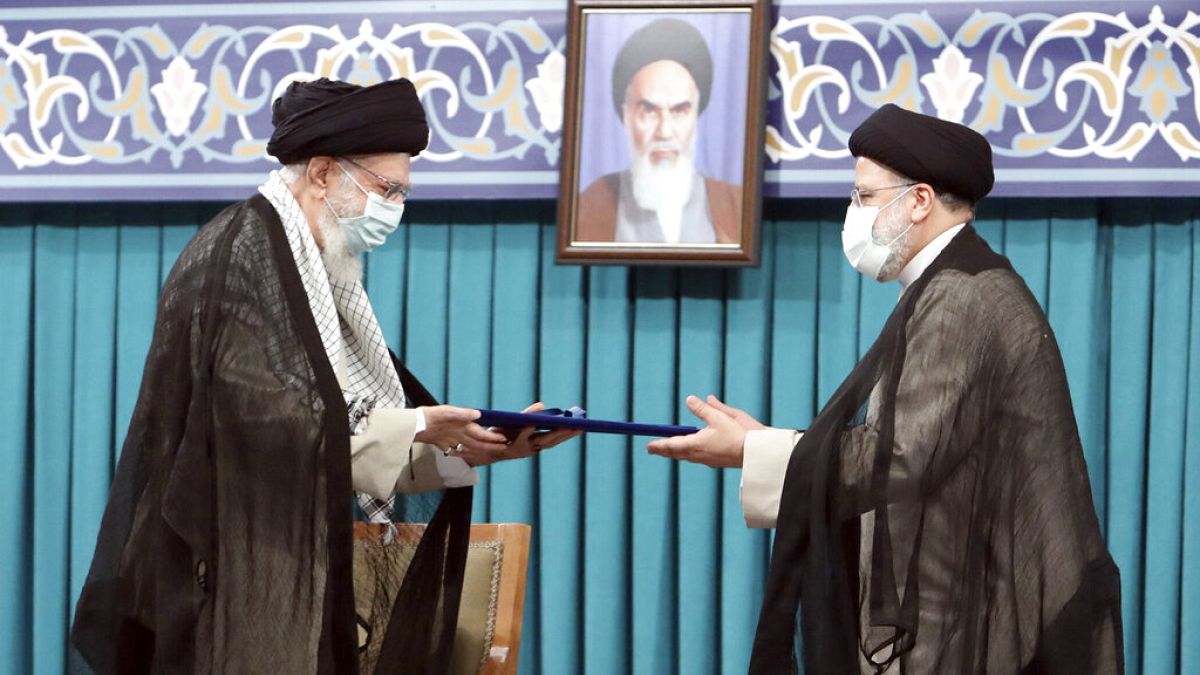Conservative cleric Ebrahim Raisi was sworn in as president of Iran at a ceremony on Thursday.
Ultraconservative judge Ebrahim Raisi has been sworn in as the new president of Iran at a ceremony in Tehran that was controversially attended by an EU diplomat.
Raisi, a long-time regime loyalist and acolyte of Iran’s ageing, hardline Supreme Leader Ali Khamenei, won a comfortable majority in last month’s presidential election.
During the ceremony at the Iranian parliament on Thursday, he stressed the need to see international sanctions on Iran lifted through diplomatic means.
But he also signalled that the Islamic Republic could try to expand its power through regional proxies as a counterbalance to the countries it sees as its rivals.
“Wherever there is oppression and crime in the world,” he said, “in the heart of Europe, in the U.S., Africa, Yemen, Syria, Palestine, the message of the [2021] election was resistance against arrogant powers.”
Raisi’s victory came off the back of a historically low turnout – officially recorded at 48.5 per cent – on June 18 due to a widespread boycott.
The 60-year-old conservative cleric was one of just seven candidates permitted to run in the presidential election by religious oversight body the Guardian Council.
Millions of Iranians opted not to vote in protest as none of the other candidates had a serious following, and six of the seven were conservatives. Blank votes and spoiled ballots accounted for 13 per cent of all votes eventually cast.
New Iranian head of state's bleak human rights record
Some 115 diplomats from more than 70 countries were due to attend the ceremony on Thursday, according to Iranian officials. But many Western states opted to boycott proceedings due to Raisi’s personal human rights record.
Before becoming president-elect in June, Raisi presided over violent crackdowns on dissidents and journalists as head of the judiciary for the past two years.
Between 350 and 1,500 Iranians are estimated to have been killed by security forces during nationwide anti-government uprisings in November 2019. Hundreds more were jailed and even executed in the aftermath.
Amnesty International has called for Raisi to be investigated for documented violations of international law during his tenure as chief justice, including torture and arbitrary detention.
Raisi began his career as a junior prosecutor in the immediate aftermath of the 1979 Islamic Revolution, which brought Iran’s Shia clerical caste to power.
In 1988, he also sat on an official four-member 'death panel' that signed off on the extrajudicial executions of hundreds of Iranian leftist prisoners, on the orders of Iran's then-Supreme Leader Ayatollah Khomeini.
In less than three months in the aftermath of the Iran-Iraq war, around 3,000 political prisoners were hanged and shot by firing squad and buried in mass graves. Next Tuesday an alleged ex-prison official said to have been involved, Hamid Nouri, will go on trial for war crimes and murder in Sweden.
EU diplomat dispatched to Tehran in bid to safeguard nuclear deal
Despite the controversy, Enrique Mora, secretary-general of the European External Action Service, flew in to attend the ceremony in Tehran on Thursday.
Mora is the EU coordinator for revived talks with Iran over a possible return to 2015 nuclear deal the Joint Comprehensive Plan of Action (JCPOA).
Talks in Vienna on reviving the agreement, which would see harsh sanctions on Iran lifted in exchange for limits on its nuclear enrichment activity, ground to a halt after the presidential election in June.
The EU’s move to send a diplomat to the inauguration was criticised by a consortium of Iranian human rights organisations in a joint statement on Wednesday.
“The EU is well aware of the fact that this man presided in 1988 and 2019 over the killing and torture of many thousands of people,” it read. “We urge the EU… to address crimes against humanity, rather than standing with those who commit the crimes.”
Mora’s dispatch to the inauguration also came just days after the United Kingdom, the U.S. and Israel blamed Iran for a drone attack on a tanker in the Arabian Sea that killed two crew members, a British and Romanian national.
EEAS spokeswoman Nabila Massrali said on Wednesday that Enrique Mora was attending the event on behalf of the EU’s top diplomat, Josep Borrell.
“It is crucial to engage diplomatically with the new administration and to pass directly important messages,” she said, adding the EU’s key priority was “to facilitate the way back to full JCPOA implementation”.
The presidents of Iraq and Afghanistan and senior officials from Oman, Qatar, Kuwait, Venezuela and South Korea also attended.
